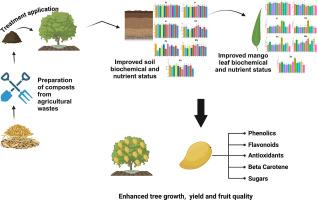利用农业废弃物和微生物协同作用改善“Amrapali”芒果的土壤功能和果实品质
IF 9.5
Q1 ENERGY & FUELS
引用次数: 0
摘要
本研究评估了不同有机肥料单独施用和与微生物群落联合施用对Amrapali芒果果园土壤健康、树木生长、产量和果实品质的影响。在12个处理中,添加微生物群落(T8)的蚯蚓堆肥显著改善了土壤的生化特性,包括阳离子交换能力、酶活性和养分有效性。经t8处理的树木冠层体积、梢长和果实产量增加,畸形穗数减少。叶片的生理生化性状(光合作用、蒸腾作用、脯氨酸、酚类物质和养分含量)也有所增强。果实品质在T8下得到改善,抗坏血酸、类黄酮、类胡萝卜素、糖含量和抗氧化活性均有所提高。相关分析和主成分分析证实土壤、叶片和果实参数之间存在正相关关系。使用水稻废料、楝树和混合叶子的堆肥处理效果与合成肥料相当。这些结果强调了蚯蚓-微生物整合是提高芒果种植生产力和资源效率的可持续战略,从而支持土壤肥力并减少对合成投入品的依赖。本文章由计算机程序翻译,如有差异,请以英文原文为准。

Harnessing agricultural waste and microbial synergy to improve soil function and fruit quality in ‘Amrapali’ mango
This study assessed the impact of various organic manures, alone and combined with microbial consortia, on soil health, tree growth, yield, and fruit quality in ‘Amrapali’ mango orchards. Among 12 treatments, vermicompost with microbial consortia (T8) significantly improved soil biochemical properties—including cation exchange capacity, enzymatic activity, and nutrient availability. T8-treated trees showed increased canopy volume, shoot length, and fruit yield, along with reduced malformed panicles. Enhanced leaf physiological and biochemical traits (photosynthesis, transpiration, proline, phenolics, and nutrient content) were also observed. Fruit quality improved under T8, with higher levels of ascorbic acid, flavonoids, carotenoids, sugars, and antioxidant activity. Correlation and PCA confirmed positive relationships among soil, leaf, and fruit parameters. Compost treatments using rice waste, neem, and mixed leaves performed comparably to synthetic fertilizers. These results highlight vermicompost-microbial integration as a sustainable strategy to enhance productivity and resource efficiency in mango cultivation, thereby supporting soil fertility and reducing dependence on synthetic inputs.
求助全文
通过发布文献求助,成功后即可免费获取论文全文。
去求助
来源期刊

Energy nexus
Energy (General), Ecological Modelling, Renewable Energy, Sustainability and the Environment, Water Science and Technology, Agricultural and Biological Sciences (General)
CiteScore
7.70
自引率
0.00%
发文量
0
审稿时长
109 days
 求助内容:
求助内容: 应助结果提醒方式:
应助结果提醒方式:


